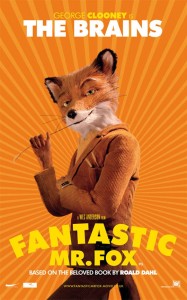 At some point along the line, we all sort of knew Wes Anderson was going to try to make an animated kid’s movie. The set design and inserts from The Royal Tenebaums and The Life Aquatic with Steve Zissou all seemed like pastel throw-ins from Blue’s Clues. All of Anderson’s characters, from Max Fischer down to Francis from The Darjeeling Limited, exhibit the listless naivety of youth that comes from being a child or wishing to be one again. But given the somewhat more mature Darjeeling, it should be some sort of surprise that The Fantastic Mr. Fox is a work of stop-motion beauty, capitalized by a not-so-kid-friendly script adapted from Roald Dahl’s book of the same name.
At some point along the line, we all sort of knew Wes Anderson was going to try to make an animated kid’s movie. The set design and inserts from The Royal Tenebaums and The Life Aquatic with Steve Zissou all seemed like pastel throw-ins from Blue’s Clues. All of Anderson’s characters, from Max Fischer down to Francis from The Darjeeling Limited, exhibit the listless naivety of youth that comes from being a child or wishing to be one again. But given the somewhat more mature Darjeeling, it should be some sort of surprise that The Fantastic Mr. Fox is a work of stop-motion beauty, capitalized by a not-so-kid-friendly script adapted from Roald Dahl’s book of the same name.
The story centers around Mr. Fox, a retired burglar who is trying desperately enjoy living a life of newspaper columns and dealing with his repressed son, Ash. Anderson added in most of the first and third acts of the plot to bracket Dahl’s pleasantly unencumbered story; even without reading the 70-page kid’s book, one can immediately tell that Ash and cousin Kristofferson are products of Anderson and co-writer Noah Baumbach’s weirdo aesthetic. Fox, voiced by George Clooney, fancies himself a four-legged version of Davy Crockett, even though his plans often go awry thanks to a heightened sense of danger his wife, Mrs. Fox, doesn’t share.
Plot feels less central to Fantastic than it probably should, mainly because the visuals are done with such colorful precision. Life Aquatic animation director Henry Selick tags along with Anderson again in this one, and his fall foliage-centric atmosphere (complete with Christmas lights-esque highlighting) heightens the evil of ‘cut down the forest’ industrialists Bogis, Bunce and Bean. The metaphor for consumerism is a little heavy-handed, but one can’t blame Anderson (or Dahl, for that matter) for doing it; hell, Wall-E was better off with the allegory.
Most of Anderson familiar tropes and teammates make appearances in Fantastic, with the exception of a few notable absences (no slo-mo?! no Kumar Pallana?!). Characters look straight in the camera, and we as an audience often feel like we’re watching an elaborately put together puppet show. Indie-rock mainstay Jarvis Cocker makes an appearance as folksy Petey, the servant of Bean. Michael Gambon and Willem Dafoe steal the show from sometimes listless Clooney; Dafoe’s alcoholic rat is on par with the dastardly lovable Anderson villain Allistair Hennessey from Aquatic. Gambon gets the line of the movie when, after Petey sings/narrates a montage of Fox and friends robbing the three evildoers, he yells “That’s just bad songwriting! You wrote a bad song, Petey!” Elsewhere, Anderson’s former roommate Owen Wilson makes a cameo as a gym coach, Adrien Brody makes the cute appearance of the movie as a field mouse, and “BAM” chef Mario Batali lends his help as a rabbit. Oh, and if you’re up on your Anderson DVD commentary, you might be wise enough to notice a familiar voice as a real estate weasel.
To call Fox solely a kid’s movie, however, would be doing it a profound disservice. Only elder audience members will catch the genius in the witty replacement of curse words for “cuss,” the WTF inclusion of a wolf, or Kristofferson’s terror that his dad may be dying. Anderson gleefully paints a mature portrait on top of Dahl’s juvenile framework, and nowhere is that more evident than Fox’s speech at the end of the first act to Kylie, his opossum sidekick: “Why a fox? Why not a horse, or a beetle, or a bald eagle? I’m saying this more as, like, existentialism, you know? Who am I? And how can a fox ever be happy without a chicken in its teeth?” Anderson tale, as it so often is, relies more on the realization that we are only what we are made from, and anybody else we try to be is just a façade. Perhaps Fox can’t be Davy Crockett, but by the end of the film, he might just realize that it’s sublime to just be the fox that he is. Maybe the youth won’t receive this message so easily, as it is coated among Anderson’s in-jokes and Rolling Stones songs, but perhaps Anderson’s lasting message of the fantastic Fantastic Mr. Fox will be heard by the parents who didn’t expect to hear it.
-Tyler Remmert